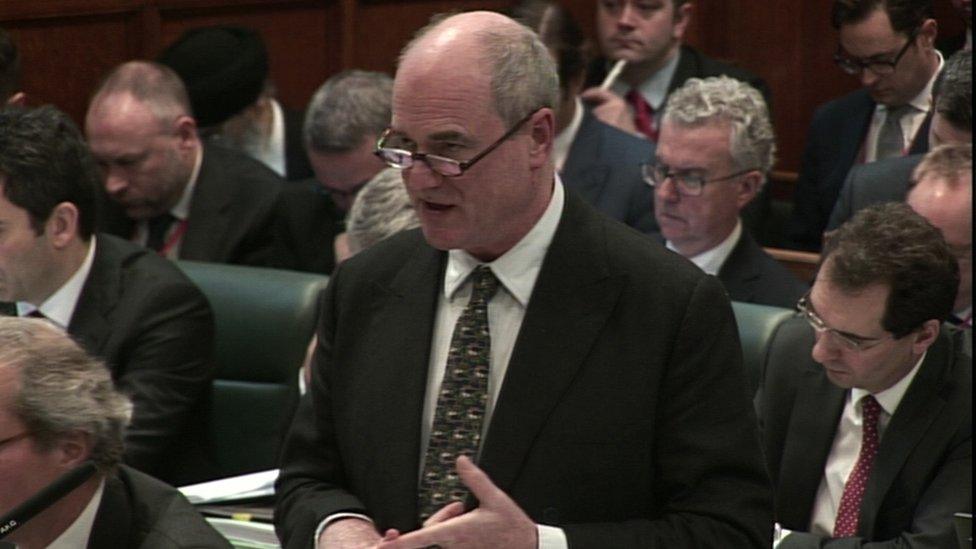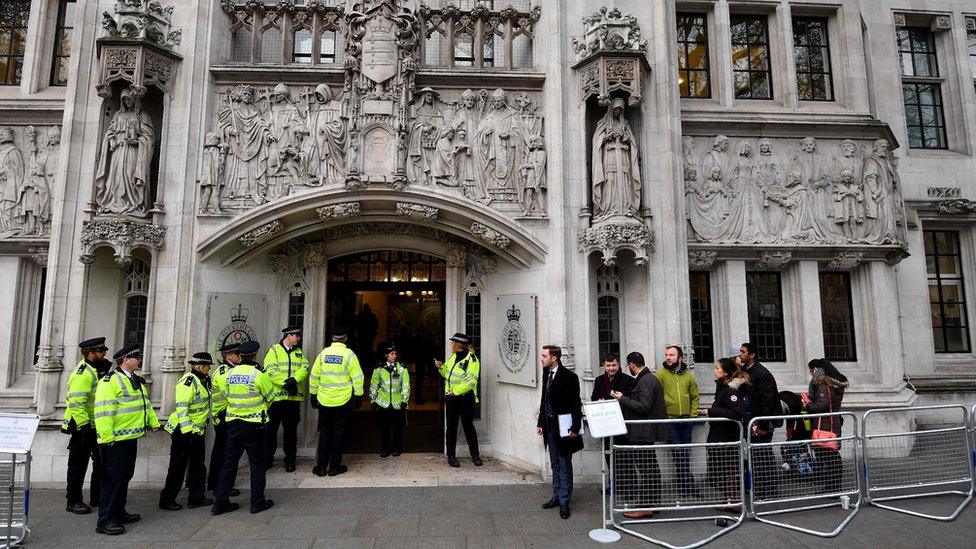Brexit court case: Ministers 'have no right to trigger Article 50'
- Published
- comments
Lord Pannick is acting for campaigner Gina Miller
The EU referendum result does not give ministers the power to trigger Brexit without consulting Parliament, the Supreme Court has been told.
The lawyer acting against the government said the "political significance" of June's vote was "irrelevant" to the legal battle.
But the government says a Parliamentary vote is not necessary before invoking Article 50 of the Lisbon Treaty.
It is appealing against the High Court ruling it lost last month.
Although the result could complicate the government's triggering of the process for the UK leaving the EU it is not expected to stop Brexit happening.
On Tuesday afternoon it was the turn of Lord Pannick, who is representing lead appellant Gina Miller, to make his case.
He said:
The legislation enabling the EU referendum does not give ministers the power to trigger Article 50
Ministers have the power to enter into new treaties but not to change the British constitution
The government must demonstrate Parliament has expressly handed powers to ministers to supersede legislation, and it had not done so over Brexit
Parliament did not intend the 1972 European Communities Act to create ministerial "prerogative" power to sweep away membership
Ministers cannot use their executive prerogative power to frustrate legislation
None of the EU-related Acts of Parliament give ministers power to trigger Article 50
Only an Act of Parliament can take away the rights linked to the EU that have been created since 1972 membership
Earlier the government's lawyer, James Eadie QC, said ministers could prepare a "one-line act" if they are forced to consult Parliament before triggering Brexit, and "certainly won't" set out possible arguments and how it intends to negotiate.
"The solution in legal terms is a one-line act," he said, adding: "It may be that would lead to all sorts of Parliamentary complications and possible additions and amendments and so on, but that's the solution."
What's at stake

What will the Supreme Court be considering in the Article 50 case?
The case is about whether the law means that the government needs the authority of Parliament to trigger the process for the UK to leave the EU
The government argues it can start the Article 50 process using "prerogative powers", a remnant of the era of all-powerful kings and queens
Justices will be ruling on who has the legal power to change the rights of British citizens
The government's case


James Eadie QC is the government's lawyer, a position known as "Treasury Devil"
Mr Eadie, who had been addressing the court since the case began on Monday morning, brought his arguments to a close by summing up why the government thinks it is entitled to use executive powers to trigger Article 50.
He said:
The power for the government to make and unmake treaties was a "key part of our constitution"
Parliament had "quite deliberately" chosen to curtail the prerogative power in some areas but had deliberately "not touched" it in relation to Article 50
Rights are created by treaties "on the international plane" not by domestic legislation
The case against the government is a "serious constitutional trap" and would mean the court imposing a new control in a "highly controversial" area
Following the EU referendum, the government using its powers in this way would be "entirely consistent with the will of Parliament"
The first day catch-up...

Brexit Supreme Court hearing: Highlights from day one
The view from court, by Dominic Casciani


This second day of the Supreme Court Brexit battle was like Men's final day at Wimbledon: two massive hitters, James Eadie for the government and David Pannick for the main claimant, smashing legal balls around the court. Were there any aces?
Lord Pannick was full of rhetorical flourishes. He argued the 1972 Act to join the then EEC had created a "new legal order" that created unique and unprecedented rights that can't be swept away by ministers. Only Parliamentarians, he said, have that right - and ministers had even told them in 2015 that the referendum wasn't necessarily binding.
But Mr Eadie warned that if the Supreme Court did not let ministers have their way, the right to trigger Article 50, the justices could be crossing the line into making law themselves - something they are not there to do.
Lord Pannick continues tomorrow and he will try to batter home an argument that he says is "so obvious, so basic" - that how we leave the EU is a matter for Parliament - not ministers.
How we got here


Gina Miller's legal team began putting her case to the Supreme Court
The government says it will trigger Article 50 by the end of March, which begins two years of formal Brexit talks.
It has said it will keep its cards close to its chest ahead of the negotiations, and has so far revealed little about what it will demand.
Campaigners, led by Ms Miller and hairdresser Deir Dos Santos, say triggering Article 50 requires Parliamentary approval, and won at the High Court last month.
The government has appealed to the Supreme Court, whose decision is expected in January.
Prime Minister Theresa May was asked about the court case during her visit to Bahrain.
"We wait to hear what the Supreme Court judgement is going to be but I'm clear that what government will be delivering and what Parliament will be delivering is on the will of the British people," she told the BBC.
Will Scotland be consulted?

Also on Tuesday, Lord Keen QC, the UK government's Scottish legal adviser, told the court Holyrood's consent was not needed before Brexit negotiations formally get under way.
The Scottish government believes it should be consulted before talks between the UK and EU begin, and its top law officer will be putting its case later in the week.
But Lord Keen said the Scottish government's argument was "fatally undermined" by powers over foreign affairs being reserved to Westminster.
He said it was plain from the legislation setting up the Scottish Parliament that it had no authority over matters of international relations, such as EU membership.
John Larkin QC, Attorney General for Northern Ireland, agreed with Lord Keen that the triggering of Article 50 by the UK Government fell within the royal prerogative.
Meet the lawyers


Top QCs David Pannick (left) and James Eadie are going head to head
The Brexit court case is pitting some of the country's top legal brains against each other.
First up, for the government, was James Eadie, the government's chosen QC, a role known as "Treasury Devil".
According to his chambers, the Cambridge-educated barrister is "the government's silk of choice for its most demanding and significant cases". Appointed to the role in 2009, his appearances acting for the government include during the Leveson inquiry into the press and the 7/7 bombings inquests.
On the other side is Lord Pannick, a member of the same chambers as Mr Eadie, who is a crossbench peer.
Educated at Oxford, he is described as "simply the best advocate of his generation", and acted in many high-profile public law cases. His previous clients include the Queen, and he has acted both for and against the UK government in the European Court of Human Rights.